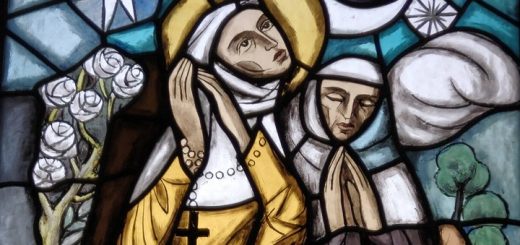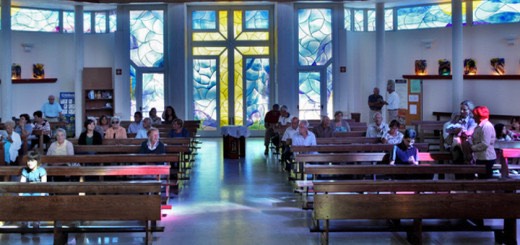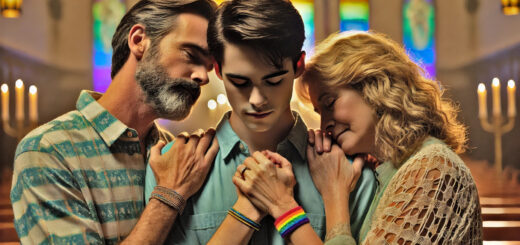Why in the Catholic Church we don't want to use the names corresponding to the gender identity that some people choose?
Reflections by Father Daniel P. Horan Ofm* published on the website of the progressive Catholic biseptimanal National Catholic Reporter (United States) On October 13, 2021, freely translated by Giacomo Tessaro
Names play an important role in the Catholic tradition. During the baptism ceremony, the first question that is asked to parents is "What name do you want to give this child?"; On the occasion of Confirmation, it is use to choose and adopt the name of a patron saint.
The members of many religious congregations adopt a new name on the occasion of their religious profession, which replaces the "legal" one (which remains on official documents). Consecrated persons adopt titles and appellations such as "Don", "Sister", "between", "Monsignor", "deacon" And so on, and expect people to respect these titles.
The meaning of the names, the adopting new ones and the importance of being called with the name that has been chosen are themes present everywhere in the Bible: Abraham becomes Abraham, you will be Sara, in the Gospels we read about angelic revelations about the names of John and Jesus, and in the acts of the apostles we see Saulo become Paul; Moving on to a new identity, with the consequent change of name, is a very rooted fact in our tradition.
So why so much resistance, sometimes even aggressive, by many Catholic environments (like schools), to use names and pronouns that reflect the gender identity that some people choose?
Calling people with the names and pronouns of their choice seems to me to be an educated and respectful act, consistent not only with the "golden rule" to do to others what we would like to be done to us (see Matthew 7:12), but also with the important role that the names have in the scriptures and in tradition.
I recently participated in a workshops On the support that Catholic universities can offer to their LGBTQ students. At a certain point, during the discussion, a participant made the simple and profound observation that an ever -growing number of people want that we turn to them in a different way from the name that has been assigned to them at birth.
For example, I was given the name Daniel, but in general, in my relationships with people, I prefer to be called Dan. Maybe it is not the same thing, but I think it would be very unresolved if I introduced myself to someone asking to be called Dan, and that person instead insisted on calling me with the name that appears on my birth certificate, or with some other name that I have never chosen.
The participant in the workshops He rightly noticed how to insist on calling someone with a name he has not chosen, and even more, refusing to call him as he wants to be called, is a rude and hostile behavior, and I would also add anti -Christian and sinful.
There is power in the names, and giving a name to yourself and others is not an act to be taken lightly. If we look at history, we find many examples of the refusal to recognize the name and identity chosen by someone, an act used to subjugate and dehumanize. We take for example the Americans who kidnapped and enslaved the Africans and treated them as if they were objects or beasts, without rights, culture, history, the ability to act and the name. In the anatious American slave system, the common practice of the owners was to give names to slaves, names that they had not chosen.
A contemporary example is what is happening in the west of China, where the Uigura Muslim minority community is not only oppressed through the "re -education fields", but it is also forbidden to use its names of Arab and Muslim origin.
It cannot be reasonably questioned that these two examples are clear violations of human rights. So why many who call themselves Christians, and above all the Catholic hierarchy, insists on doing the same with LGBTQ people? I don't have an answer to this question.
To be sincere I remain very, very perplexed, just like the participant in the workshops, in the face of the arrogance and the audacity of those who inhumanize people in this way. Not only is it unresolved to refuse to call a person with the name or favorite pronouns, but in the case of many Christians who refuse to perform this act of good creation, moreover there is the denial of the same existence and the experience of transgender and non -binary people.
The evident transfobia that is reflected in denying the fundamental human right to personal identity and self -determination is not compatible with the message of the Gospel, nor with the ancient Catholic tradition of the change of name linked to the religious profession and to the assumption of a new identity before God and others.
Frankly, I would not know what to do in front of those who darkly ignore the reality and experience of those who are different from them, to make them understand the damage they cause. Perhaps some kind of civil (better, ecclesial) and non -violent disobedience could ensure that Christians (and above all, those who, in the Church, hold positions of authority) have a small taste of shame, lack of respect and inhumanization that make others experience.
As it should be evident, I fully support the right of each person to be called and identified in the way you have chosen, and my Christian faith teaches me that this should also be applied to people and the transfobic and Greek communities, even when they do not want to know to deal with dignity and respect their brothers and sisters in Christ.
I wonder how the bishops who have recommended to the faithful not to use the names and pronouns chosen by trans people, or the principals who forced teachers, employees and students to do the same thing, or any person who did something similar, if they were apostrophized by the people with names they have not chosen, and who may not like it.
After all, if these self -proclaimed masters of faith are putting into practice the golden rule, then we should do to them what they do to the others, right? And if they insist in saying that lack of respect for people, and forcing them to be called as they do not wish, it is part of the "Christian" way, then I imagine that that bishop would have nothing against if I called him with female pronouns and endings, or "Sister Maria", instead of "Monsignor Tal-Dei-Tali", or that that principal that wants to be called "Lady" it would have nothing against if I called it "Gianni".
Obviously I do not think that inflicting, to those who hurt, the same damage perpetrated on people already vulnerable in schools, parishes and communities is a correct way to act. As my mom often told me and my brother when we were little, "Two wrong do not reason".
However, I hope that those who continue to lack respect in this way take a step back, and reflect on how it would feel and how it would react if it were in the proverbial role of students, the faithful and the next treated in that way.
The Catholic tradition, which gives a lot of value to the power of names and to assign the name, is also a tradition that recognizes an absolute value (as principle, at least) to the dignity and intrinsic value of every human person.
It is a terrible thing that many of those who call themselves Catholics use our tradition to refuse and erase the identity chosen by our sisters and brothers in Christ.
* The Franciscan father Daniel P. Horan works at the University of Notre Dame, in the Indiana, as director of the center of spirituality and professor of philosophy, religious studies and theology. Follow it on Twitter: @Danhoranofm
Original text: Why Catholics Should Use Favorient Gender Pronouns and Names






